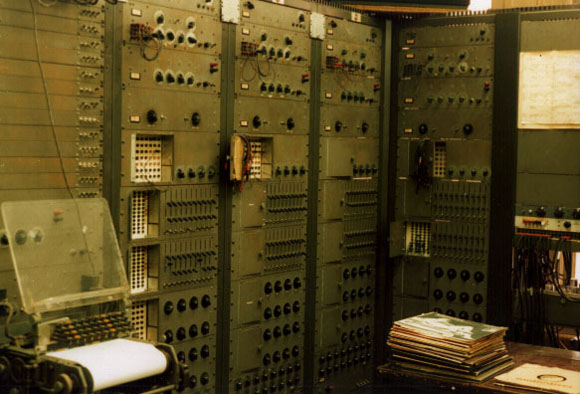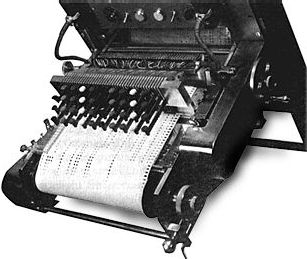
The Princeton, NJ chapter of the ACM (Association for Computing Machinery) is celebrating 50 years of the RCA Synthesizer on Thursday, April 14. (PDF info)
Automatic lounge music: The RCA Mark I
wasn't exactly what we'd think of as a synthesizer. Developed by RCA
engineers Harry Olsen and Hebert Belar, its original intention was to
pump out artificially-generated mood and lounge music for the honchos
at RCA Victor Records. (RCA must have been a little disappointed when
the device both failed to generate music on its own and was later
appropriated by academic serial composers — unless there's something I
don't know and Milton Babbit's gone platinum.)
How about a nice Hawaiian punch? The RCA wasn't real-time,
either. Instead, you programmed sounds via a punch-paper roll with
settings for filters, envelopes, modulators, and resonators, and heard
the results on 12 vacuum tube oscillators. The RCA did have built-in
"CD burning" of sorts: you could record sounds to a built-in laquer
disk cutter. Strangely enough, RCA Victor didn't see the commercial
application and instead of being used as a lounge music generator, the
Mark II model (upgraded to tape output) wound up in the joint
electronic music center of Columbia and Princeton Universities.
The rest is — you know. The RCA failed to revolutionize mood
music, but serial composers like Milton Babbit, Charles Wuorinen, and
others had a field day with the new synth, the first to really provide
composers with musical control. The RCA ultimately influenced the
real-time synths that would follow; if it didn't directly influence
Moog or Buchla, it certainly fired up the composers who hung around them. The RCA was also the spiritual predecessor to innovations like Max Mathews' computer-based system, which in turn led to the modern Csound.

Happy birthday: Well, a bit late, but well-deserved
nonetheless. (The Mark I was shown to the American Institute of
Electrical Engineers in New York on January 31.) The assembled folks in
Princeton will be host to Pulitzer- and MacArthur-winning composer and
Princeton Prof. Emeritus Milton Babbit, as well as some experts on the
RCA's history and operation, with music included. Anyone in Princeton out there? Check the PDF from the invite and let me know if you go!
And where'd that RCA go? Last I heard, the three-ton Mark II was lying in pieces around the Columbia Computer Music Center, unmaintained. Say it ain't so. I mean, it's great you have a gyro mouse in your lab, but this is a piece of history. (Anyone know for sure?)